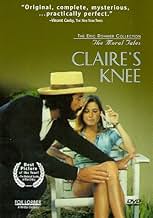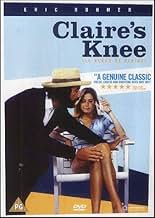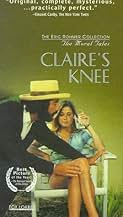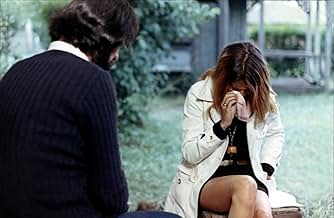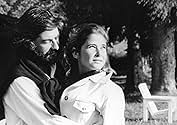On lakeside summer holiday, a conflicted older man is dared to have a flirt with two beautiful teenage half-sisters despite his betrothal to a diplomat's daughter and the fact that the girls... Read allOn lakeside summer holiday, a conflicted older man is dared to have a flirt with two beautiful teenage half-sisters despite his betrothal to a diplomat's daughter and the fact that the girls have boyfriends.On lakeside summer holiday, a conflicted older man is dared to have a flirt with two beautiful teenage half-sisters despite his betrothal to a diplomat's daughter and the fact that the girls have boyfriends.
- Awards
- 6 wins & 4 nominations total
- Director
- Writer
- All cast & crew
- Production, box office & more at IMDbPro
Featured reviews
Well, I came across this movie while reading Roger Ebert's Awake in the dark and thankfully was able to get a chance to get a hold of Éric Rohmer's masterpiece Claire's Knee. I hadn't read Ebert's review (usually I watch a movie before going through the reviews) so was not sure what was I going into - haven't watched any trailer as well so I was not sure what this would be about, but with my experience with foreign movies I was sure it would be good and I guessed by the name that it suggested something like Lolita or many other movies based on such abnormal (sometimes immoral) desires.
So, when you start with the movie you are somewhat aware where this is going - the expected storyline basis the title- but soon comes to these well-performed characters and while getting engrossed in the discussions between characters on love, choices, life, etc. you get more understanding on the way each of them sees the world - what they desire? what they like? and why they do so? The great part with such discussion was that first, it didn't go into a preachy tone- that x is right and y is not, each of them had their views which they justified by their past or by their behavior - it reminded me of the Before trilogy and, second, while listening to such great lines, one start thinking and contemplating of one's own stand on the topic of love, moral & desires.
There is a scene where the protagonist talks about a notion where he as a person do not have desires on the beauty aspect of women but because of a character his friends ask him to play, he started thinking like that character, and somewhere knowingly or unknowingly he too as a person starts to have those desires. The beauty of this notion is that this happens to the viewer as well, you don't look at claire's knee or her in that sense- but because the movie tells you that this is important - this is beautiful - and to be desired you look for it in that passionate way. You too, play the character in the movie.
So, when you start with the movie you are somewhat aware where this is going - the expected storyline basis the title- but soon comes to these well-performed characters and while getting engrossed in the discussions between characters on love, choices, life, etc. you get more understanding on the way each of them sees the world - what they desire? what they like? and why they do so? The great part with such discussion was that first, it didn't go into a preachy tone- that x is right and y is not, each of them had their views which they justified by their past or by their behavior - it reminded me of the Before trilogy and, second, while listening to such great lines, one start thinking and contemplating of one's own stand on the topic of love, moral & desires.
There is a scene where the protagonist talks about a notion where he as a person do not have desires on the beauty aspect of women but because of a character his friends ask him to play, he started thinking like that character, and somewhere knowingly or unknowingly he too as a person starts to have those desires. The beauty of this notion is that this happens to the viewer as well, you don't look at claire's knee or her in that sense- but because the movie tells you that this is important - this is beautiful - and to be desired you look for it in that passionate way. You too, play the character in the movie.
Like most of Eric Rohmer's work, you will either enjoy the laid-back atmosphere and chatty characters in Claire's Knee, or find it all incredibly boring. I happen to love them. It's rare to find movies that don't want to be sensationalistic and violent, but would rather present universal questions and then investigate them throughout the course of the movie.
I would recommend Love in the Afternoon as an entry into Rohmer however, as it is a little more pacey for those unfamiliar with his style. And my personal favourite is "The Green Ray"... but don't start there as the subject of the film is about boredom!
I would recommend Love in the Afternoon as an entry into Rohmer however, as it is a little more pacey for those unfamiliar with his style. And my personal favourite is "The Green Ray"... but don't start there as the subject of the film is about boredom!
Claire's Knee is a playful sex comedy that almost gets a little too playful for conventional morality. Filled with gorgeous Alpine scenery and strikingly honest dialogue, the film gives us plenty to think and talk about. In Claire's Knee, Jerome (Jean-Claude Brialy) is a good looking diplomat who is on a brief vacation in the Alpine village of Talloires before he is to be married. He meets an old friend Aurora (Aurora Cornu) who is a novelist. Aurora wants to observe Jerome interacting with other women so she can be inspired to write something about it, and persuades Jerome to court two teenage girls, daughters of the woman she is staying with.
He first tries to court Laura, superbly played by Beatrice Romand, an unusually perceptive teenager, but fails. At first their relationship is fun but later becomes tense when both realize the inappropriate nature of their behavior. He then turns attention to the beautiful but less profound Claire (Laurence De Monaghan) and develops an obsession to fondle her knee, a seemingly perverse fixation but in Rohmer's eyes, it seems rather innocent. Jerome is on the verge of temptation but is rescued by the careful decisions of his own conscience and his commitment to his fiancée. I think everyone here learns through failure that sometimes it is necessary to step back and get a handle on the possible consequences of your actions.
He first tries to court Laura, superbly played by Beatrice Romand, an unusually perceptive teenager, but fails. At first their relationship is fun but later becomes tense when both realize the inappropriate nature of their behavior. He then turns attention to the beautiful but less profound Claire (Laurence De Monaghan) and develops an obsession to fondle her knee, a seemingly perverse fixation but in Rohmer's eyes, it seems rather innocent. Jerome is on the verge of temptation but is rescued by the careful decisions of his own conscience and his commitment to his fiancée. I think everyone here learns through failure that sometimes it is necessary to step back and get a handle on the possible consequences of your actions.
In "les Liaisons Dangereuses", Isabelle de Merteuil defies Sebastien de Valmont to deflower Cécile de Volanges, a young girl, then to seduce and to reject Marie de Tourvel, a married woman. If he succeeds in accomplishing it, the bounty will be Isabelle herself.
Nothing as harsh in "Le genou de Claire", but there is the similar thematic about a gamble. Jérome (Jean Claude Brialy) meets Aurora (Aurora Cornu), an old friend (lover?). Aurora, a writer, is in search of a new story for a possible novel. She offers Jérome a gamble in the form of a love game ("marivaudage" as we say in French) involving Laura (Beatrice Romand), his neighbors daughter, who is obviously attracted by him, and, later, the Laura's sister Claire (Laurence de Monaghan) whose knee fascinates Jérome.
Unlike "The Dangerous Liaisons", not a single ounce of violence or dramatic events, everything will be just metaphorical: a half-stolen kiss and a stroked knee (and no excessive promised reward from Aurora). "Le Genou de Claire" is a filmed essay about friendship, love, sensuality, desire, fantasies and their incoherences.
As usual with Eric Rohmer, thoughts and emotions have to be said and not just shown, therefore everything is explicitly said by the characters. This is the reason why the Rohmer's movies seem unrealistic and talkative to the unprepared audiences. Some say that Rohmer is a writer who uses a camera instead a pen, but that primacy of the dialog doesn't prevent Rohmer to use the actor's play, the camera, the set's and costumes colors in a very accurate way. In fact, he is a real film director with a very personal style of cinematic language.
The cast: A Jean-Claude Brialy bearded like a pirate plays a charming young diplomat and he delivers his lines with natural ease and a sensual chemistry between him and the beautiful Aurora Cornu (a Romanian poet, novelist, and actress). Unfortunately the Romanian actress doesn't seem at ease with those long lines in French, and, in my humble opinion, she overplays quite a bit.
Beatrice Romand, 18 years old at that time, in her first true part in a movie, plays the 16 yo Laura. She steals the show, the light and the camera, and in view of some mind-blowing shots, for example in the Jérome's room, she seems to have been an obvious delicacy to light up for the great master Néstor Almendros, in charge of the cinematography. When the movie was released in 1970, the French medias became suddenly obsessed for a while by this very young actress, her exotic beauty and riveting charm. The clever and fizzy Béatrice appeared everywhere in the magazines and on the 2 (not more than two in 1970!) channels of the French TV! Then the fame faded away. The industry of entertainment prefers the blonds... The Beatrice's fans (I am a Beatrice's fan!) love Rohmer's "Le Beau Marriage", "Conte d'Automne" and Claude Faraldo's "Themroc", a situationist weird movie.
Laurence de Monaghan, in contrast with the dark haired and milky skinned Beatrice Romand, plays Claire, a tanned blond of cold beauty, in fact a perfect arrogant and stuck-up chick with perfect body, legs and knee, the famous knee, object of Jérome's desire.
For the fans of Fabrice Luccini, his short part as the young Vincent pontificating about girls is a "collector", not to be missed! By the way, still for his fans, not to be missed too there is his hilarious (and sulfurous) part in Walerian Borowczyk's "Contes Immoraux" (Immoral Tales) 2 years later. Keep in mind that "Le Genou de Claire" forms a part of Rohmer's "Contes Moraux" (Moral Tales)...
Time has passed, "Le Genou de Claire" remains amongst the Rohmer's most sensuous movie, and Claire's knee keeps on fascinating.
Nothing as harsh in "Le genou de Claire", but there is the similar thematic about a gamble. Jérome (Jean Claude Brialy) meets Aurora (Aurora Cornu), an old friend (lover?). Aurora, a writer, is in search of a new story for a possible novel. She offers Jérome a gamble in the form of a love game ("marivaudage" as we say in French) involving Laura (Beatrice Romand), his neighbors daughter, who is obviously attracted by him, and, later, the Laura's sister Claire (Laurence de Monaghan) whose knee fascinates Jérome.
Unlike "The Dangerous Liaisons", not a single ounce of violence or dramatic events, everything will be just metaphorical: a half-stolen kiss and a stroked knee (and no excessive promised reward from Aurora). "Le Genou de Claire" is a filmed essay about friendship, love, sensuality, desire, fantasies and their incoherences.
As usual with Eric Rohmer, thoughts and emotions have to be said and not just shown, therefore everything is explicitly said by the characters. This is the reason why the Rohmer's movies seem unrealistic and talkative to the unprepared audiences. Some say that Rohmer is a writer who uses a camera instead a pen, but that primacy of the dialog doesn't prevent Rohmer to use the actor's play, the camera, the set's and costumes colors in a very accurate way. In fact, he is a real film director with a very personal style of cinematic language.
The cast: A Jean-Claude Brialy bearded like a pirate plays a charming young diplomat and he delivers his lines with natural ease and a sensual chemistry between him and the beautiful Aurora Cornu (a Romanian poet, novelist, and actress). Unfortunately the Romanian actress doesn't seem at ease with those long lines in French, and, in my humble opinion, she overplays quite a bit.
Beatrice Romand, 18 years old at that time, in her first true part in a movie, plays the 16 yo Laura. She steals the show, the light and the camera, and in view of some mind-blowing shots, for example in the Jérome's room, she seems to have been an obvious delicacy to light up for the great master Néstor Almendros, in charge of the cinematography. When the movie was released in 1970, the French medias became suddenly obsessed for a while by this very young actress, her exotic beauty and riveting charm. The clever and fizzy Béatrice appeared everywhere in the magazines and on the 2 (not more than two in 1970!) channels of the French TV! Then the fame faded away. The industry of entertainment prefers the blonds... The Beatrice's fans (I am a Beatrice's fan!) love Rohmer's "Le Beau Marriage", "Conte d'Automne" and Claude Faraldo's "Themroc", a situationist weird movie.
Laurence de Monaghan, in contrast with the dark haired and milky skinned Beatrice Romand, plays Claire, a tanned blond of cold beauty, in fact a perfect arrogant and stuck-up chick with perfect body, legs and knee, the famous knee, object of Jérome's desire.
For the fans of Fabrice Luccini, his short part as the young Vincent pontificating about girls is a "collector", not to be missed! By the way, still for his fans, not to be missed too there is his hilarious (and sulfurous) part in Walerian Borowczyk's "Contes Immoraux" (Immoral Tales) 2 years later. Keep in mind that "Le Genou de Claire" forms a part of Rohmer's "Contes Moraux" (Moral Tales)...
Time has passed, "Le Genou de Claire" remains amongst the Rohmer's most sensuous movie, and Claire's knee keeps on fascinating.
one of the most beautiful movie by Rohmer. when I saw this film for the first time i was in Brasil (Saao Paulo) and the movie was whistled at the end of the performance by the assistance. In fact, I found the movie a little bit ridiculous and native. i reviewed this movie on TV, a few years later, in France, and was then enthusiastic. I've since become a fan of Rohmer and I've seen nearly all of his films.
Did you know
- TriviaNot counting a picture frame seen from a distance, the title character's first appearance takes place 47 minutes into the film.
- GoofsNear the end of the movie, Jerôme and Claire Annecy are going by boat to Annecy but must seek refuge under a shelter because of a storm. During their conversation, the irregular flow of the watering device used to create the big rain can be heard clearly.
- ConnectionsEdited into 365 Days, also Known as a Year (2019)
Details
Box office
- Gross worldwide
- $5,112
- Runtime1 hour 45 minutes
- Sound mix
- Aspect ratio
- 1.37 : 1
Contribute to this page
Suggest an edit or add missing content

![Watch Bande-annonce [OV]](https://m.media-amazon.com/images/M/MV5BMTgyOTk2NmMtZTk3ZS00Yjg4LWIwMzEtM2RmZDQ0ZWVhZWUzXkEyXkFqcGdeQXRyYW5zY29kZS13b3JrZmxvdw@@._V1_QL75_UY281_CR10)

